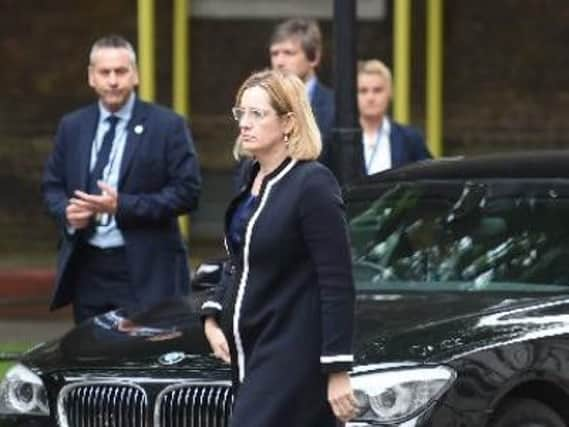Business leaders and food and farming industries condemn leaked immigration plan


The papers, which has been circulated among senior Government officials, include plans to end free movement on the day Britain leaves the EU, introduce new entry requirements for EU nationals, and limit permits for new workers.
The measures have been welcomed by some in the pro-Leave camp who see it as the next step in the bid to "take back control" of UK borders.
Advertisement
Hide AdAdvertisement
Hide AdBut a number of leading trade groups have expressed concern, with the NFU warning of a "massive disruption" for farmers and the Institute of Directors arguing it is "not the approach that business... will want to see".
"This is a leak so anything in these documents would need to be confirmed by the government and much of its contents would be subject to negotiation with the EU," said IoD head of employment and skills.
"However, at face value, this is not an approach that business leaders - especially of small-and medium-sized firms - will want to see.
"The UK needs an immigration system which provides control while also enabling employers to access the foreign workers they need at all levels - whether it be short term seasonal workers, intra company transfers or permanent positions."
Advertisement
Hide AdAdvertisement
Hide Ad"An abrupt reduction in the number of EU workers able to work in the UK after we leave the EU would cause massive disruption to the entire food supply chain - a solution for the whole industry is needed to ensure the sector has access to the skills and labour it needs," added the NFU's Minette Batters.
"We are calling for an urgent and clear commitment from Government to ensure that farmers and growers have access to sufficient numbers of permanent and seasonal workers post-Brexit."
The papers, which were leaked to the Guardian, have not been signed-off by ministers and it has been reported that Home Secretary Amber Rudd has been working to soften the Government's approach to post-Brexit migration.
She and Chancellor Philip Hammond have both expressed a desire to avoid disruption to businesses and employees when Britain leaves the EU, with both suggesting there would be little immediate change to the immigration system.
Advertisement
Hide AdAdvertisement
Hide AdHowever, under the plans outlined in the document, EU nationals will be required to provide a passport or "Home Office biometric immigration document" even during an implementation or transition phase.
This phase will then be replaced with tougher rules, which will limit work permits for low-skilled workers to just two years, and place tighter restrictions on which family members allowed to remain.
The papers also reveal a renewed drive to get employers to prioritise the training and recruitment of British workers over the foreign workforce.
Ukip spokesman Steve Crowther said the proposals take "the right line", adding: "The measures to prioritise higher-skilled migrants over low-skilled ones are absolutely non-negotiable. Low-skilled migration benefits businesses, not communities."
Advertisement
Hide AdAdvertisement
Hide AdFormer Ukip leader Nigel Farage said the measures were "a big step in the right direction", tweeting: "Let's hope this government have the guts to carry it through."
But pro-Remain MP Alison McGovern said the document reflected a"mean and cynical approach" by the Government "which is already deterring people from coming here".
“Our economy and our public services benefit massively from the contributions of EU citizens," she said. "There are 60,000 working in our NHS alone and many others working in all sectors, including in so-called ‘low skilled’ jobs. Without their efforts, our economy and our public services would be put at risk.
“The Government need to show that Britain is open to those who want to come here to work hard and contribute."